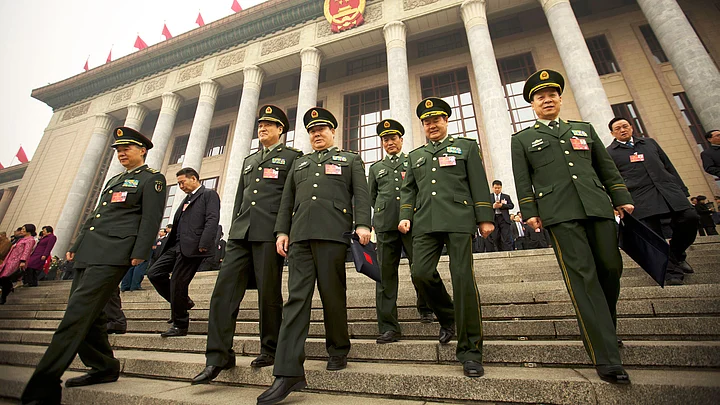China on Friday announced that it will hike its defence budget by 7-8 percent this year from about $145 billion last year amid the growing confrontation with the US in the disputed South China Sea.
China’s military budget will continue to increase. But the increase will be smaller compared to last year. It will about 7-8 percent.Fu Ying, spokesperson for the annual session of the national legislature, National People’s Congress (NPC)
It will be the first single-digit rise in spending since 2010, when the military budget logged a 7.5 percent increase. ‘The exact figure will be released in a budget report tomorrow (Saturday),’ she said.
Accusing the US military of of trying to increase its defence budget by hyping the South China Sea (SCS) issue Fu, former Vice Foreign Minister, said the increase is in line with China’s national defence need and fiscal revenue.
In 2015 the budget was increased by 10.1 per cent, bringing it to about $145 billion at the time. From India’s point of view China’s defence spending was almost three times more.
Terming the increase small, Fu said in formulating the defence budget China will take into consideration its defence needs, economic development and fiscal position.
She quoted Chinese President Xi Jinping’s words last year that China’s 2.3 million strong military will faithfully fulfil its “sacred duty” of protecting the security of the nation and people’s well being and carry out the noble mission of upholding world peace.
So the ongoing military reform is aimed at achieving this goal.Fu Ying, Spokesperson, NPC
Earlier answering a question on the growing confrontation between US and China over the SCS, she accused the Washington of militarising the SCS by hyping the “China threat”.
Currently most of the advanced aircraft and warships passing through the SCS Sea belong to the United States.
According to its strategy of pivot to Asia-Pacific, the US has decided to deploy 70 per cent its naval force to this region. It is also strengthening military presence in the Asia Pacific region with its allies.
“Isn’t it militarisation?” She asked in reply, adding that wrongly accusing China’s militarisation in the waters is a hegemonic act in language which will also mislead the situation.
China is revamping its military under a new initiative of President Xi to focus on winning local wars.
Besides the strategic rivalry with the US, China is entangled in a maritime dispute in the South China Sea with Vietnam, Malaysia, the Philippines, Brunei, Taiwan and Japan, and its long-running border dispute with India has not been resolved either.
Most of Chinese lawmakers and ordinary people are not pleased and do not agree with the US showing off military power by sending warships to waters close to the SCS islands and reefs, Fu said.
The US said it did not take sides in the SCS disputes, however, its acts and rhetoric make people feel that it is raising tensions in the region, Fu said.
Fu said China’s construction projects in the islands and reefs of SCS, which were objected to by a number of other claimants to the dispute, are necessary for providing public services and strengthening China’s capacities for safeguarding regional peace.
Fu said China has never recognised some countries’ illegal occupation of some islands and reefs and China’s policy of putting aside disputes and seeking joint development is based on China’s sovereignty over those islands and reefs.
As the islands and reefs are far from China, they should have defence capacities, but those efforts should not be described as militarisation. If the United States is really concerned about regional stability and peace, is should support negotiations between China and neighbouring countries.Fu Ying, Spokesperson, NPC
(At The Quint, we question everything. Play an active role in shaping our journalism by becoming a member today.)
